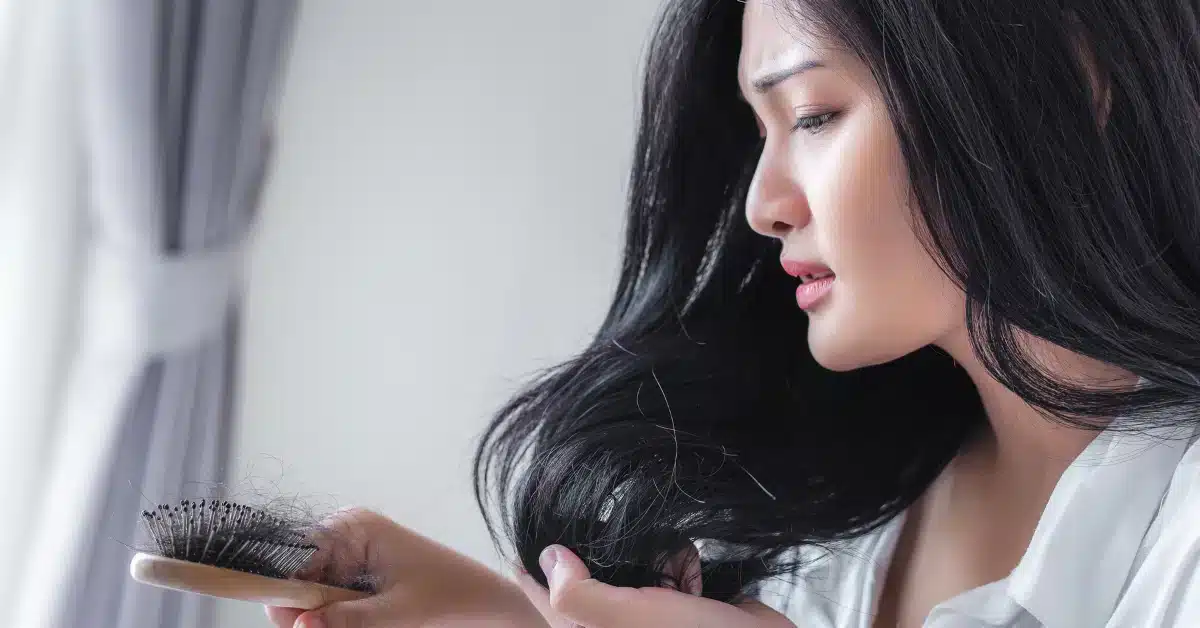Understanding Hair Loss After Miscarriage: Is it Normal?
Numerous women experience miscarriages, which can result in various mental and physical complications.
Hair loss is one such complication of a miscarriage.
The hormonal changes and physiological stress associated with a miscarriage can temporarily disturb the hair growth cycle.
This can lead to hair shedding or loss.
According to the Cleveland Clinic, approximately fifty percent of women may experience visible hair loss.
Read the article to learn more about the link between hair loss and miscarriage.
What causes hair loss after a miscarriage?
Hair loss after a miscarriage can be caused due to several reasons.
Some of them include:
Hormonal changes
Hormones play an essential role in the hair growth cycle.
High Estrogen levels during pregnancy may extend the Anagen phase, while low Estrogen levels after birth may cause Telogen gravidarum or postpartum hair loss.
After a miscarriage, the sudden drop in hormones like Estrogen and Progesterone linked to pregnancy can throw off the balance of the hormones.
This hormonal imbalance can cause temporary hair loss in some women.
Stress
A miscarriage can often lead to stress.
The body’s response to stress can cause Telogen Effluvium, a condition in which a large number of hair follicles enter the resting phase prematurely.
This can cause a lot of hair to fall out a few months later.
Iron deficiency

Iron deficiency affects up to 52% of pregnant women.
Lack of iron can also cause Telogen Effluvium or diffuse hair loss.
According to a research study, after a miscarriage, a woman lost her hair more often, which also made her hair thinner.
It took a few months for her hair loss to stop, and it was only after she consumed more iron that her hair quality and thickness improved.
However, more research is needed to find the link between iron deficiency being a cause of hair loss after miscarriage.
How to prevent hair loss after a miscarriage
Hair loss after a miscarriage is temporary.
These measures can be taken to stop hair loss following a miscarriage:
Consume a balanced diet
A nutritious diet abundant in iron, protein, vitamin D3, and other vital nutrients can encourage hair growth and prevent hair loss.
Therefore, eating a balanced diet with various nutrients and foods is essential.
Get enough sleep

The importance of adequate sleep for overall health and well-being, including hair growth, is very important.
Have a consistent sleep pattern and aim for seven to nine hours per night.
Supplements
According to the American Pregnancy Association, supplements like vitamin B complex, Biotin, vitamins C & E, and zinc can help prevent hair loss or have healthy hair.
Stress management
Stress can also contribute to hair loss.
Therefore, finding ways to reduce stress with Yoga, meditation, or just relaxing is essential.
Consult an expert
Consult a healthcare provider if you are experiencing hair loss and are unsure of the cause.
The healthcare provider may be able to suggest additional treatments or therapies to prevent or remedy hair loss.
Takeaway
Hair loss can sometimes occur after a miscarriage, but it is temporary.
It can happen due to Hormonal changes, stress, or iron deficiency.
Consuming a balanced diet, getting enough sleep, supplements, and stress management can help prevent hair loss.
Consult your doctor if you suffer from hair loss after a miscarriage for proper treatment.
Frequently Asked Questions
Why am I losing so much hair after a miscarriage?
Hair loss after a miscarriage can happen due to fluctuating hormone levels like Estrogen and Progesterone, stress, or iron deficiency. Consult an expert to get a proper diagnosis and treatment.
How long after a miscarriage do your hormones go back to normal?
It may take six weeks or more for the hormone levels to return to normal, but it can also depend on the stage or the underlying cause of the miscarriage.
Will hair grow back after miscarriage?
Yes, hair loss after miscarriage is temporary, and hair will grow as the hormone levels return to normal. It is also essential to consume a healthy diet, get enough sleep and reduce the stress levels for hair growth.
Can you have hair loss after a miscarriage?
Yes, Hair loss can happen after a miscarriage due to hormonal imbalance, insufficient iron in the body, or stress. To receive an accurate diagnosis and treatment, consult with your doctor.
How long does hair loss last after a miscarriage?
In most cases, hair loss following a miscarriage can last between three and six months. However, the hair may require three to six months to return to its normal state.
WowRx uses only high-quality sources while writing our articles. Please read our content information policy to know more about how we keep our content reliable and trustworthy.






